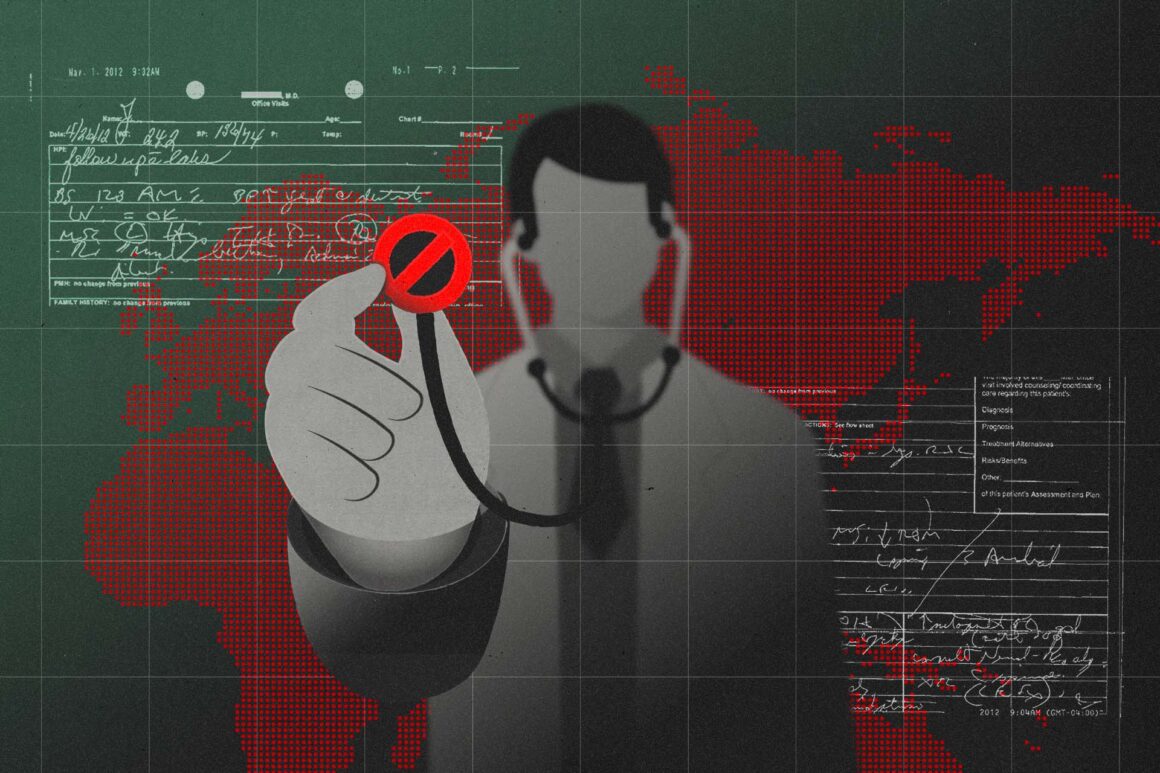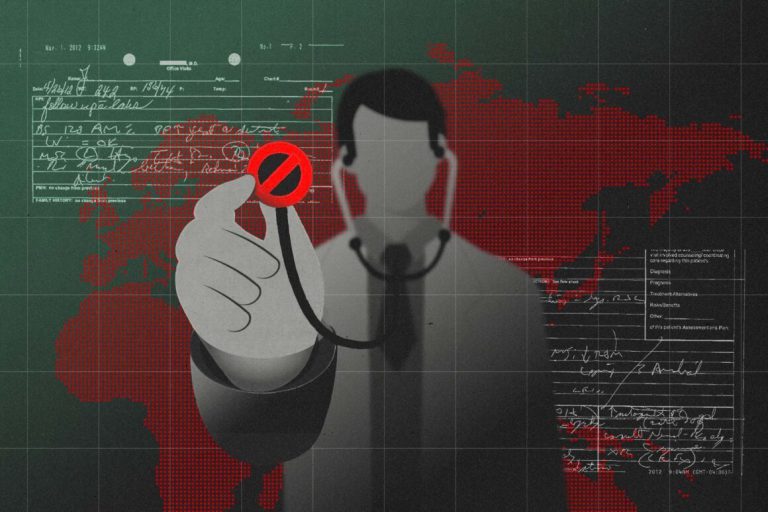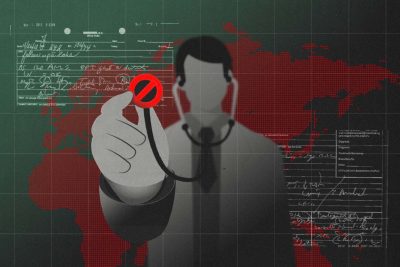Síta Hrňová (Investigace.cz)
Tomáš Madleňák (ICJK)
Daniel Flis (Frontstory.pl)
This story was coordinated by OCCRP.
Illustration: James O’Brian/ OCCRP 2025-10-30
Síta Hrňová (Investigace.cz)
Tomáš Madleňák (ICJK)
Daniel Flis (Frontstory.pl)
This story was coordinated by OCCRP.
Illustration: James O’Brian/ OCCRP 2025-10-30
Failed warning systems, complacent officials, and a lack of accountability mean doctors who have lost their medical licenses due to serious wrongdoing can relocate and practice in different countries across Europe and beyond. After receiving questions from OCCRP and its partners, regulatory authorities in the U.K., Germany, Cyprus, Spain, and Norway have confirmed that they are investigating individual doctors practicing in their jurisdictions.
This investigation is a compilation of work led by OCCRP, Norway’s VG, and The Times of London, along with partners across Europe, to look at public records and request information from national authorities about licensed and banned doctors. Reporters confirmed more than 100 cases where banned doctors were licensed to practice elsewhere — with the majority of them still working.
By calling their new workplaces, making online appointments, or visiting their practices in person, reporters confirmed that the majority of these doctors were not only still licensed, but actively practicing medicine. Some of them relocated to a country where they already had a license, while others managed to obtain new licenses.
Most countries investigated by reporters did not publish data on whether doctors had ever had their licenses suspended or revoked, making it difficult for members of the public and journalists to see whether they had ever faced disciplinary action. When journalists asked for that information by sending freedom-of-information requests to national licensing authorities, they were often rejected for privacy reasons. In most cases, reporters did not find allegations had been brought against banned doctors after they relocated, but the investigation raises questions over how medical professionals who have lost their licenses for serious offenses, including patient harm, can so easily pick up their careers in another country.
How It Works on Paper
Although there is a system for automatic recognition of professional qualifications for doctors moving within the EU and EEA, they must still apply to authorities in the country where they want to work in order to get a license to practice there.
It is mandatory for member states to send alerts about doctors whose professional activities have been restricted or prohibited, even temporarily, by national authorities or the courts via the commission’s Internal Market Information system (IMI).
OCCRP asked the European Commission for copies of all alerts and email notifications sent out about restrictions and prohibitions on doctors between 2016 and July 2025 and received more than 17,000 results. But reporters found the alert system was barely or never used by some countries in relation to disciplinary actions against doctors.
From Slovakia to England and Back to Slovakia
Alexander Perrona (34) was admitted to the emergency room at Lincoln County Hospital in Lincoln, England, on October 14, 2018. He had a swollen leg, chest pain, and difficulty breathing. An X-ray showed a blood clot and blockage in his lungs.
After starting treatment, his condition began to improve, and he was scheduled to be transferred to another ward the next day. Instead, Dr. Mohamed El-Sakka discharged him with antibiotics to treat the infection. As reported by the local outlet LincolnshireLive, three days later, Alexander Perron collapsed at home in the bathroom, and the paramedics who were called to the scene could only confirm his death. The investigation showed that Perron’s death was caused by natural causes – a pulmonary embolism – which was exacerbated by the doctor’s negligence.
Mohamed El-Sakka obtained his medical degree in Košice and is still registered as a doctor in Slovakia. By the time Perron died, the doctor already had a long history of misdiagnosis. He had repeatedly discharged patients who clearly needed further treatment and at least once tried to alter documentation to cover up his mistakes. In 2015 and 2016, he was suspended in the United Kingdom. Documents from the General Medical Council show that, in 2013, he was found to have falsified several prescriptions for medications that he had taken out himself.
After returning to Britain and the death of patient Perron, Dr. El-Sakka was permanently removed from the register of doctors in the United Kingdom in 2023. However, he is still registered with the Slovak Medical Chamber and could practice medicine there.
“The public rightly expects that any doctor practicing in this country will meet the highest professional standards. These terrible allegations represent a serious failure in our healthcare regulatory systems, which I will not tolerate,” said UK Health Secretary Wes Streeting, commenting on the findings of the international group of journalists.
Practice shows that the IMI system does not work, partly because several countries are not fulfilling this obligation. The Investigative Center of Ján Kuciak (ICJK) managed to prove that Slovakia is one of them. The Ministry of Education has reported only three cases to the system. The remaining 16 that the ICJK is aware of are not found in the European system’s data. The ministry claims that it sends reports based on information from the courts.
The ICJK was unable to determine whether the British authorities failed to send a report to IMI, or it was the Slovak authorities who failed to check the system, and were at fault in the case of Mohamed El-Sakk in 2015.
The Fault of the British System?
In 2019, a medical tribunal in the United Kingdom decided to remove Czech doctor Jiří Lojda from the register of the British medical professional organization, the General Medical Council. The decision states that, in 2014, while working at two hospitals in England and Scotland, Lojda provided “substandard care to twelve patients” and “committed serious misconduct in his treatment of five patients.” As part of the proceedings, Lojda’s registration was initially suspended for two consecutive years. The doctor did not defend himself or participate in the proceedings in any way.
Lojda told Investigace.cz that he considers his expulsion to be the result of a dysfunctional British system, including inadequate computer technology and general confusion in the workplace. He did not wish to comment further on the matter. Today, the former director of the Pilsen Region Emergency Medical Service works as a general practitioner in Telč, Czech Republic.
In the Czech Republic, only a person who is a member of the Czech Medical Chamber (ČLK) may practice medicine. This is stipulated by law, which also determines the conditions for registration with the chamber.
According to the law, a doctor applying for registration with the chamber must submit to this professional organization, in addition to proof of appropriate education and legal capacity, evidence that the candidate has not been expelled from the Czech Medical Chamber in the previous five years. However, the ČLK does not take into account whether the person in question has been expelled from professional organizations in other countries. If a citizen of any European Union country applies for membership in the Czech Medical Chamber, then, after submitting confirmation of the necessary education, there is nothing to prevent them from joining.
Daniel Valášek, director of the ČLK office, agrees that this is a loophole in the law and a potentially risky phenomenon: “The essence of the Medical Chamber is to defend the interests and safety of patients by guaranteeing the quality of doctors in the Czech Republic. When a doctor comes from abroad, they should prove their integrity.” According to him, it would make sense to require a license from abroad or a criminal record check as a condition for medical practice.
Practicing in Poland After a Name Change
Three out of the 100 discovered cases of banned doctors working in another country are from Poland. A gynecologist banned from working in the UK is practicing in Kalisz under a changed name. A pathologist who defrauded the US of payment for fictitious overtime has registered his business in Poznań. A dentist who is banned in Sweden is the co-owner of a clinic in Warsaw.
In order to obtain the right to practice in Poland, a doctor from another EU country must, in addition to documents confirming their education and experience, provide the local medical chamber with evidence of their good character. The regulations require the submission of documents “confirming that the requirements regarding the ethical conduct of a doctor are met and that he or she has not been convicted of a crime and has not been suspended or deprived of the right to practice due to serious professional misconduct or a criminal offense.”
It is therefore possible that in these three cases, the medical chambers decided that the offenses for which the doctors had been stripped of their right to practice abroad were not serious enough to prohibit them from working in Poland.
We don’t know if there are more such cases. Case identification is hampered by the Polish Supreme Medical Chamber. After months of requests, they did not even provide a list of active doctors (although this is required by law). Meanwhile, in the UK, it takes just a few clicks for anyone to find out the details of a medical court ruling.
A Matter of Private Data?
In Hungary, after months of research, the conclusion is that we know essentially nothing about doctors who have been banned, suspended, or punished for ethical misconduct. Even though Átlátszó requested this data from the National Hospital Directorate in a public interest data request, they did not disclose any information regarding suspended doctors.
In most countries, like Hungary, the public disclosure of data is limited. However, in the Netherlands, Denmark, Ireland, the United Kingdom, Switzerland, Norway and Lithuania, the data of suspended or banned doctors is public. Through public interest data requests, journalists working on the project were able to obtain information in additional countries too, including Finland, Sweden, Serbia, Slovakia and North Macedonia.
Among the banned doctors found in Hungary by the investigation are Dr. Sz., Dr. A., Dr. Ny. and Dr. H. Their names are not disclosed for legal reasons, as in Hungary it is not permitted to disclose and disseminate personal data related to violations committed by healthcare workers in the course of their profession, or their criminal personal data in the event of criminal cases.
Despite receiving no information from the Hungarian side, Átlátszó received a response from the British authorities, according to which they had notified the Hungarian institutions of the proceedings in four cases: in three cases, the relevant department of the National Hospital Directorate, and in the case of Dr. Ny., Semmelweis University.
Átlátszó tried to find out from the doctors involved whether they faced any consequences after returning home for offenses committed abroad. They were unable to reach two of them, and one doctor threatened legal action for “harassment,” but the fourth doctor spoke freely about his case. He said that in one foreign country he was unsuccessful in applying for a job because of his previous case, but in another country he was able to find employment without any problems. In Hungary, the case appeared on his chamber data sheet for two years, but, after his return home, this no longer caused any problems; he was employed at a state hospital.
Calls for Urgent Change
In response to the original investigation by OCCRP and partners, Norway’s health minister proposed the creation of a new system to prevent doctors from moving across borders to practice after being barred in other countries. Regulators in several European countries have also confirmed they are investigating individual physicians.
“This is serious. People should be able to be completely confident in those who provide healthcare in Norway,” said Jan Christian Vestre, Norway’s Minister of Health and Care Services.
Norway has re-opened investigations into 12 doctors after receiving questions from reporters. The Norwegian Board of Health Supervision had previously looked into the doctors, but the handling of the cases stopped due to errors, officials told VG.
“It is very worrying to discover that, although we have a European alert mechanism for serious cases in the healthcare system, it is full of loopholes and is used inconsistently,” Nicolae Ștefănuță, vice president of EU Parliament, told Public Record in Romania.
“I call on Member States to treat these alerts with the utmost responsibility and not to let serious cases go unpunished,” he added.
After questions from journalists, regulators in Germany, Spain and Cyprus also confirmed that they had launched probes into banned doctors working in their jurisdictions.
In Germany, the Düsseldorf district government confirmed it has started an investigation into a doctor who lost his license in Switzerland following a conviction for sexually assaulting an 18-year-old female patient.
This article is a compilation of investigations published by Átlátszó.hu, Investigace.cz, ICJK.sk, and research by FRONSTORY.pl. The project was coordinated by OCCRP, who published the findings here and here.
Subscribe to Goulash, our original VSquare newsletter that delivers the best investigative journalism from Central Europe straight to your inbox!
Tomáš Madleňák is a Slovak journalist who has worked for the Investigative Center of Ján Kuciak since 2020. He is based in Bratislava.
An economist, former policy director at an environmentally-focused think tank, Orsolya Fülöp was a freelancer at Magyar Narancs and Atlatszo. She specializes in investigating controversial environmental issues, from burning landfills to leaking nuclear power plants. She also manages Atlatszo’s international projects.









